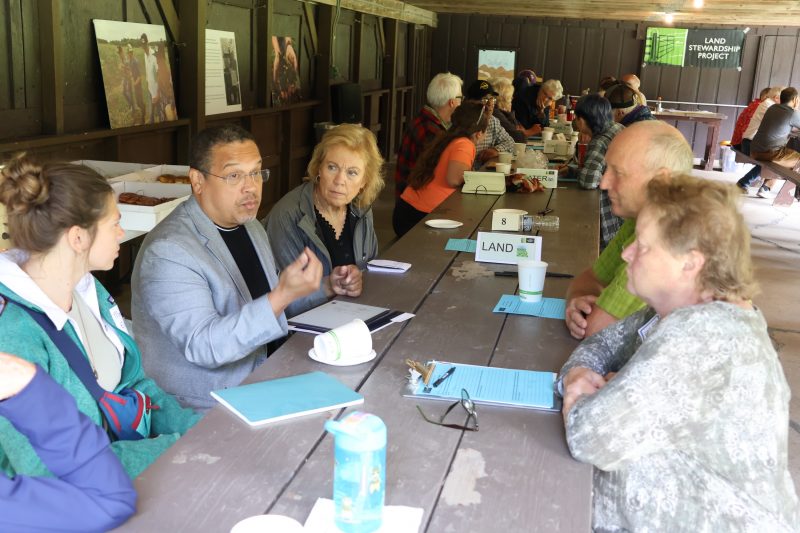PAYNESVILLE, Minn. — Unprecedented consolidation in agriculture is emptying the landscape of farmers, which is having a trickle-down impact on everything from rural schools and churches to Main Street businesses, said three-dozen farmers and other rural residents who gathered Aug. 24 for an open-air Land Stewardship Project (LSP) town hall meeting on the shores of Lake Koronis near Paynseville. Their message was directed toward Keith Ellison, Minnesota’s Attorney General, who traveled from Saint Paul to take questions from the audience and talk about what can be done to enforce laws pertaining to unfair manipulation of markets, among other things.
“I think probably the most important issue facing us in the rural community today is consolidation,” said Darrel Mosel, a Sibley County crop and livestock farmer. “I’ve been farming 47 years, and consolidation is just ripe, it’s just crazy what’s happening in my area.”
The meeting, which was a follow-up to a March LSP town hall involving the Attorney General in west-central Minnesota, was held at a time when four large firms handle 85% of all beef cattle purchases and 67% of all hog purchases. Just seven corporations control roughly half of the grain and oilseed market globally. During a recent 12-month period, Minnesota, the nation’s sixth-largest dairy producing state, saw 146 dairy farms go out of business, a 7% drop. Meanwhile, mega-dairies with tens of thousands of cows now control more market share than ever, according to industry reports.
Several dairy farmers who attended the meeting shared stories of processors refusing to pick up milk from smaller operations. Mosel, a long-time dairy producer, said he’s had a hard time passing his operation on to a younger generation because of the buyers’ bias against smaller dairies.
“That’s very frustrating and very confusing, because we all know for the most part they are buying milk from the larger dairies,” said Mosel.
During small group discussions held during the Paynesville meeting, participants shared other examples of how consolidation in agriculture is impacting their communities: from fewer kids riding school buses and ag supply businesses disappearing, to pollution of water, destruction of roads and abuse of ag workers.
“It’s not just the economics that’s impacted, it’s the unraveling of the social fabric and the weakening of the rural community,” said Terry VanDerPol, a retired farmer from Granite Falls, Minn.
Meeting participants asked the Attorney General to investigate whether processors and input suppliers were violating the law through monopolistic control of the markets. A concern brought up by several farmers was whether co-ops that were originally organized by small and medium-sized producers had fallen under the control of a handful of large-scale producers and the industry, and thus were no longer serving the best interests of their general membership.
“We need to take our co-ops back,” said VanDerPol. “They’ve been hijacked by big business.”
Ellison said his office is committed to focusing on consolidation issues in agriculture, and is particularly interested in enforcing antitrust laws. Elizabeth Odette, who is heading up the office’s work related to antitrust enforcement, was on-hand in Paynesville to share what farmers and others need to do to report violations.
She described several agriculture-related investigations her office is already involved in, including lawsuits challenging John Deere’s restrictions on what repairs farmers can make to their equipment, Syngenta and Corteva’s use of “loyalty programs” to limit farmers’ access to lower-priced generic pesticides, and Agri Stats’s alleged control and manipulation of meat statistics to keep prices high. In order to gather evidence that can lead to a viable case, the Attorney General’s office needs to hear directly from the farmers and others who are being negatively impacted by consolidation, said Odette. She and Ellison emphasized that initial tips can be handled confidentially.
“We want to learn from you all, because we know there are many other agriculture markets that have the same things or similar things going on when it comes to unfair practices,” said Odette, who chairs the antitrust committee of the National Association of Attorneys General.
Ellison said that a narrative often circulated by large corporations and the government is that a “get big or get out” approach to farming benefits the food system and is inevitable. But, he said, that narrative runs counter to federal laws such as the Sherman Antitrust Act and the Packers and Stockyards Act, which are on the books to prevent big corporations from engaging in practices that make it impossible for small and medium-sized farms to compete.
These laws “don’t say, ‘Get big or get out,’ ” said Ellison. “They say, ‘Stand tall for small.’ Because having a large number of buyers and sellers is good for competition, is good for innovation, is good for workers, is good for the environment.”
Ellison and Odette encouraged meeting participants to report potential antitrust violations to www.ag.state.mn.us/office/complaint.asp#antitrust or by calling 800-657-3787.
-30-
The Land Stewardship Project (LSP) is a nonprofit organization dedicated to fostering an ethic of stewardship for farmland, promoting sustainable agriculture and developing healthy communities in the food and farming system. LSP has offices in the Minnesota communities of Montevideo, Lewiston and South Minneapolis.
